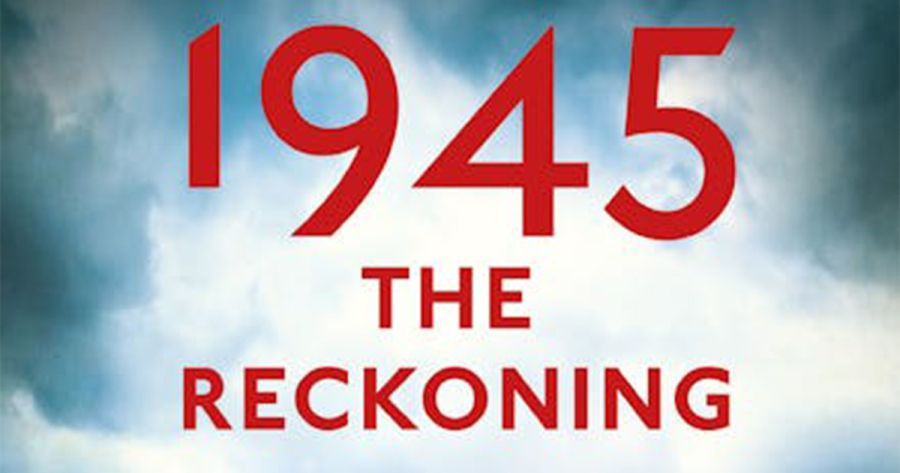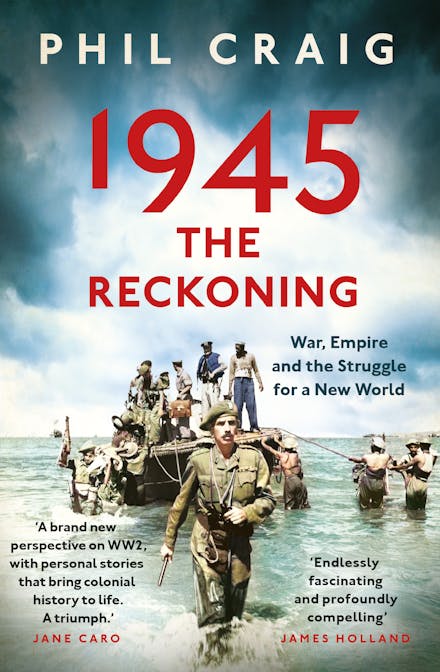
- Free Article: No
- Contents Category: History
- Review Article: Yes
- Article Title: Everything, everywhere
- Article Subtitle: A complex history taken with absolutes
- Online Only: No
- Custom Highlight Text:
A wise scholar once advised me against using absolutes in historical writing. The first reason is functional. When you resort to words such as ‘everyone’, ‘everything’, and ‘nobody’, you invite trouble; most of the time you can find an exception. The second reason is more important. The use of such words can betray an approach that packages the messy past too neatly, where there is little room for nuance and even less for uncertainty. Confidence doesn’t necessarily produce the best results.
- Book 1 Title: 1945: The Reckoning
- Book 1 Subtitle: War, empire and the struggle for a new world
- Book 1 Biblio: Hodder & Stoughton, $34.99 pb, 381 pp
- Book 1 Cover Small (400 x 600):

- Book 1 Cover (800 x 1200):

- Book 1 Readings Link: https://www.readings.com.au/product/9781399714501/1945-the-reckoning--phil-craig--2025--9781399714501#rac:jokjjzr6ly9m
I read little popular history, but I get the sense that its authors like to be firm and confident in their judgements. ‘Everyone’ is a favourite word in Phil Craig’s 1945: The Reckoning. Perhaps the function of such all-or-nothing language is to keep the narrative moving, with the attraction of a brisk, punchy read privileged over historical complexities. If nature abhors a vacuum, so too it seems do popular historians. In popular history, each question must have its answer.
Indeed, there are no silences here. Sections of this work are dramatised, or ‘lightly novelised’, to use the author’s phrase. There is a fashion for such novelisation – Craig is certainly not the first to take this approach – but does it have a place in works of history? He explains that these sections are based on historical sources, and so they may be, but ‘novelised’ is surely the key word. I guess it is a matter of reader taste. How much fiction do you like with your history? Where sources are thin, are you content with imagined descriptions? These are the questions – the trouble – that arises when historians blend fact with fiction, even when the ‘novelised’ sections are brief and few. 1945 is a lively and sometimes rewarding read, in which Craig offers interesting observations, but I ended the book unsatisfied. Did he take liberties with the sections that most interested me? Can I take his word or was I spun a tale?
This book is the third in a trilogy on Britain and the war, but it also stands alone. Prospective readers won’t need to have read the two earlier titles to tackle this work. As the title and subtitle indicate, the book is an attempt to reckon with the nature and effects of the victory won by Britain and its allies in World War II. Craig’s focus is empire, and the ways that the conflict shaped the application – and rejection – of British imperial power. Within that framework, he concentrates on India, with some of the tale told through the experiences of the famed Indian nationalist Subhas Chandra Bose (1897-1945), whose deep anti-imperialist sense saw him pursue alliances with the fascist regimes in Berlin and Tokyo. Bose’s story, and that of the Indian National Army he led, provide a powerful counter to any lingering notion that Britain’s commonwealth universally embraced the cause of crown and empire.
An old line has it that World War II cost Britain its empire. While there is truth in this, it is also a teleological interpretation where Britain is cast as a docile participant in decolonisation. Craig’s book tells otherwise, showing the extent to which Britain and its politicians clung to concepts of empire, even exercising these beliefs through the application of indiscriminate force. One unsavoury example involves the Dutch East Indies. In late 1945, and with Whitehall of the view that a continuation of Dutch colonialism was preferable to an independent Indonesia, British and Indian forces fought and attempted to suppress Indonesian nationalists in bloody battles. The continued pull of colonialism among sections of British society was such that former bitter enemies were quickly rendered friends, the British releasing thousands of Japanese prisoners of war to join their desperate endeavour in nascent Indonesia. This ‘reckoning’ with the sum of Britain’s wartime record is one of the book’s strengths. Craig is bracingly clear-eyed in his judgements of British policy and behaviour during and after the conflict, repeatedly showing a willingness to discuss uncomfortable aspects of wartime history.
Craig uses personal stories as the basis for his narrative. His choice of which lives to follow reveals an interest in less familiar histories of World War II, and these stories make for engaging reading. And yet, despite this focus, the reader must still confront stereotypes: Jews have money, Australians soldiers are boorish, Japanese soldiers are suicidal, to name three. I suspect that here, too, the problem is the desire to keep the narrative moving. To be clear, Craig does not ascribe to these stereotypes – his book is an effort to counter accepted tenets of World War II history – and in places he contests them strongly, yet stereotypes and generalisations appear nonetheless, greasing the progress of passages where complexity might slow the reader. This haste is evident elsewhere. For instance, a discussion of the February 1945 Yalta conference omits any mention of its exact timing, which is crucial given that it was among Franklin D. Roosevelt’s last major engagements as president. A map of colonial territories circa 1939 shows Papua and New Guinea as British, which might surprise Australian readers.
The rise of popular history, and the tendency within the genre towards novelisation, is a reaction to the perceived drudgery and stolid detail of academic history. The wise scholar I knew did not care for either label, believing that good history was good history, whether it was produced in or beyond the academy. Good history, he held, reads easily and has intellectual rigour derived from careful research and considered thinking. And though he did not say it, no novelisation. Now there’s a model to follow.


Comments powered by CComment